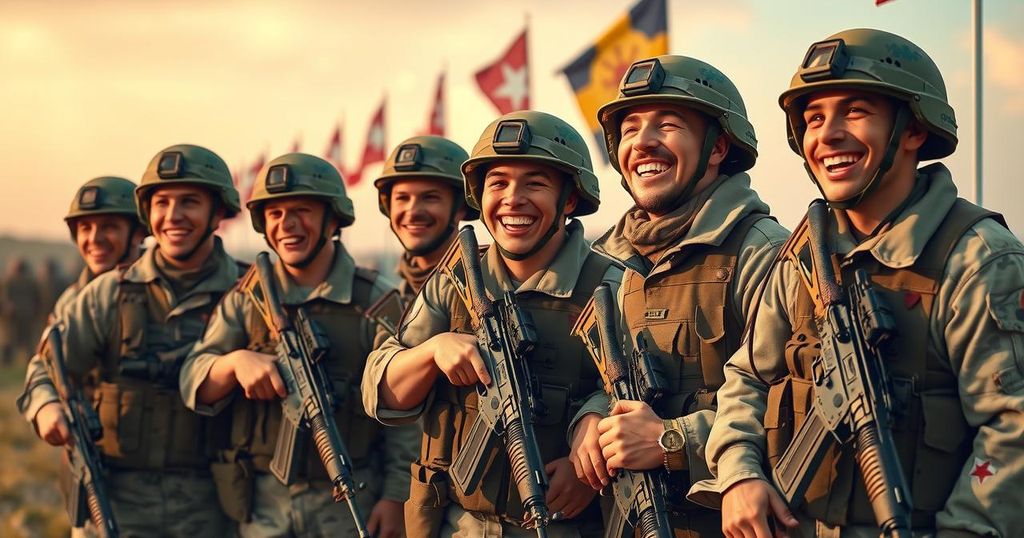Russia and North Korea Amplify Military Alliance Through Propaganda Efforts

North Korean soldiers in Russia are participating in a propaganda campaign showcasing their support for Russia’s war in Ukraine, singing Soviet songs and engaging in military drills. Approximately 15,000 North Korean troops have been deployed, with a third reportedly suffering casualties. Meanwhile, Russia aims to present a united front to the world, although Ukrainian sources provide contrasting accounts, painting a more complicated picture of their partnership.
In a recent display of their military alliance, North Korean troops in Russia engaged in a performance that showcased their camaraderie—singing the Sovet-era song “Katyusha”. The event highlighted a growing propaganda effort aimed at promoting their partnership, particularly as North Korea sends thousands of soldiers, about 15,000 as reported, to aid Russia’s ongoing war in Ukraine, which has been a closely guarded secret until now.
This increased visibility of North Korean soldiers follows months of silence around their deployment to Russia, revealing Moscow’s desire to project strength against Western criticism. The propaganda machine is working overtime, attempting to present a unified front that differs starkly from the narratives provided by Ukraine and its allies, who characterize the relationship as fraught and rigid.
Reports indicate that nearly a third of the deployed North Korean soldiers, approximately 4,700, have suffered casualties. In exchange for their military support, Kim Jong Un’s regime has reportedly received drones, missiles, and other military technology from Russia as confirmed by South Korea’s intelligence. These North Korean forces were notably effective in regaining areas in southern Russia occupied by Ukrainian troops.
President Vladimir Putin is leveraging this information as a showcase of Russia’s alliances to display to the West. During the recent Victory Day parade, he emphasized this growing partnership. Notable North Korean military officials, including generals, were cited by South Korean intelligence as key figures leading the North Korean contribution to the fight in Ukraine.
The timing of Kim’s acknowledgment of the collaboration comes amid nationalistic fervor in North Korea, where his claims are bolstered by patriotic propaganda. He introduced the returned injured soldiers as heroes, framing their involvement in the conflict as an exercise of sovereign rights and a source of national pride.
Russian state media have since launched a barrage of propaganda showcasing North Korean soldiers as valiant and capable. Some analysts view this campaign as a strategic measure to align North Korea as a steadfast ally, a notion underscored by various releases of footage depicting military drills and coordinated efforts.
One video featured soldiers exchanging hugs and planting flags of Russia and the Soviet Union into the ground—an image meant to symbolize a deepening bond. Other clips showcased North Korean soldiers performing training exercises, ostensibly to reinforce their martial prowess. The intent is clear: to mold perceptions of the North Koreans as indispensable allies in the ongoing conflict.
Recent comments from Moscow’s ambassador to North Korea indicate plans to honor the soldiers by naming streets in the Kursk region after them—an effort aimed at solidifying this cooperative spirit. Contrary to the glowing imagery from state media, Ukrainian and South Korean reports linger on the challenges faced by North Korean forces on the battlefield, including confusion over advanced drone technology and mockery from Russian troops.
The alliance between these two nations has deepened since a mutual defense pact in the previous summer, with North Korea reportedly supplying artillery to Russia, whose dependence on Korean-made munitions is significant. Additionally, the partnership extends beyond military cooperation; they are expanding ties in sectors like tourism, agriculture, and healthcare.
Ultimately, the North Korean soldiers’ performance on Russian television serves a dual purpose: showcasing their commitment and building a narrative of brotherhood between the two nations while maintaining propaganda efforts to motivate their respective populations.
In a final flourish during the broadcast, the soldiers expressed gratitude in Russian and were met with applause. The segment wrapped up with the correspondent thanking them for their contributions to safeguarding Russian territory, a sentiment reflecting the larger goals of their showcased alliance.
Such developments continue to raise questions about the authenticity of this burgeoning alliance, amid the undercurrents of mistrust from surrounding nations and contrasting reports.
In summary, the evolving military alliance between Russia and North Korea is being showcased through a concerted propaganda effort that seeks to highlight their partnership amid ongoing conflicts. With North Korean troops actively engaged in the Ukrainian front and a mutual defense pact solidified, both nations seem intent on projecting a united front against dissent. However, contrasting reports from Ukrainian and South Korean sources remind observers of the reality on the ground, casting doubt on the robustness of this cooperative narrative.
Original Source: www.livemint.com






